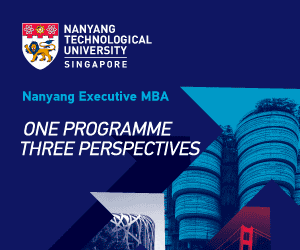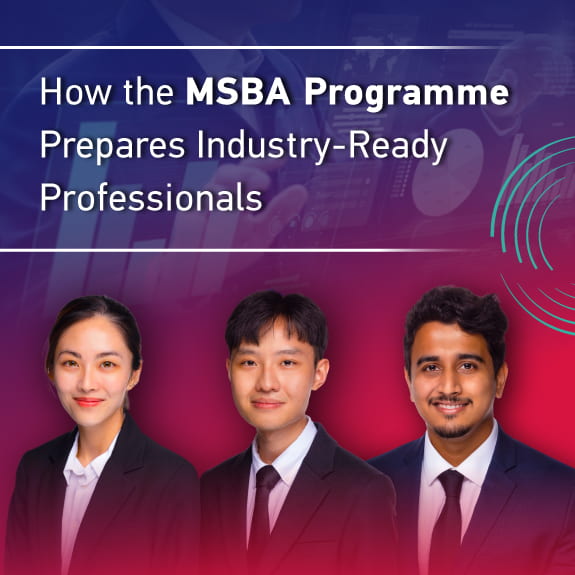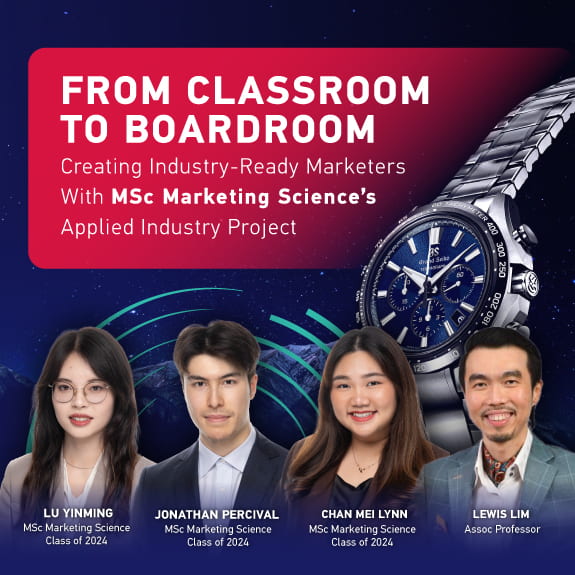
On The Cutting Edge: A Day In The Life Of A Programmatic Marketer
Graduate Studies Blog

MSC MARKETING SCIENCE
On The Cutting Edge: A Day In The Life Of A Programmatic Marketer
When Devesh Shahi was studying for his Bachelor’s in electronics engineering, he never dreamt that he would take the leap into a thriving marketing career.
“In India, we like to say that you have to become a doctor or an engineer either,” he joked. “That’s why I went into engineering.”
After graduation, he interned with a digital advertising company and became intrigued by the fast-paced world of programmatic advertising. He landed a role in GroupM India as a Programmatic Executive, but soon realised he had many gaps in his marketing knowledge.

“If I wanted to pursue a marketing career, I needed to learn the basics of marketing,” he explained. The MSc Marketing Science (MMS) programme by Nanyang Technological University (NTU) fit his needs perfectly: “I liked that it was an all-rounded programme, covering everything from basics including Branding to technical courses such as Marketing Analytics.”
One year after wrapping up his MMS journey, he gives us a peek into his dynamic life as a Senior Performance Programmatic Executive at GroupM Nexus. Here, he takes us behind the scenes of programmatic ad buying and shares what excites him about his daily work.
A day in the life of a programmatic expert
If you’ve recently noticed ads for Singapore F1 tickets popping up as you browse online, some might be Devesh’s work. As a programmatic expert, he uses cutting-edge algorithmic software to place digital ads and target the right audiences efficiently.
Unlike traditional advertising, programmatic advertising automates the buying and selling of online ad space in real-time. When you click on a publisher’s website or app, algorithmic software analyses your activity data to pinpoint the most relevant ads for you. The software then calculates bids for the ad spot based on the advertiser’s budget and strategies, and the ad with the winning bid is served to you – all within milliseconds.
For advertisers to reach target audiences cost-efficiently, they need skilled marketers like Devesh to plan, manage, and optimise their buying. Devesh’s typical day begins with campaign tracking, where he monitors whether clients’ campaigns are on track to reach KPIs.
“My entire day is shaped around troubleshooting campaigns that aren’t performing well,” he explained. “This ensures that we achieve the client’s goals by the end of the campaign.”
When new client campaigns come in, Devesh collaborates with other teams to set up the campaigns. “First, the Media Planning team will strategise a media plan based on the client’s requirements and goals,” he shared. “I’ll look at the plan to ensure the KPIs are achievable before setting up the campaign on the respective platforms such as Google Ads.”
Devesh handles campaigns for a range of prestigious clients in Singapore, including Grab and Kimberly-Clark. The most satisfying part of his job, he said, comes from spotting the ads he’s put up.
“It’s very exciting when I see the ads I’m responsible for on digital screens around MRT stations and bus stops,” he said. “With the Singapore Grand Prix coming up, I’m also seeing the F1 ads I put on YouTube. That excites me a lot.”
Unlocking a more global career
Devesh had been keen on working in Singapore for some time. “When I was working in GroupM India, I collaborated with our head office in GroupM Singapore,” he recounted. “That’s when I realised that Singapore is a hub for the head offices of major companies.”
He attributes his success securing a role at GroupM Singapore to his MSc Marketing Science journey at NTU’s Nanyang Business School. “I didn’t apply for the job – the HR team noticed my profile and contacted me directly on LinkedIn,” he revealed. “I think having a marketing degree from NTU made a huge difference in my resume.”
Regarding marketing, cultural dexterity is key – every market has its cultural nuances. Devesh’s MMS experience gave him a hands-on understanding of Singapore as well as regional contexts, enabling him to excel in the interview.
“Modules like Branding and Consumer Psychology offered a lot of case studies related to the region. For example, we did a case study on Singapore Airlines’ ‘Singapore Girl’,” he said. “Such case studies equipped me to demonstrate my knowledge of the Singapore market in my interview.”
Keeping pace as marketing evolves
Beyond cultural competence, Devesh has gained the confidence to take on a fast-changing marketing landscape through the MMS programme.
Digital marketers must constantly adapt to new technologies and trends on the horizon, such as Google’s phaseout of third-party cookies in Chrome by 2025. Since third-party cookies enable tracking users’ browsing activities and targeting them with ads, a cookieless future will have widespread repercussions for programmatic experts like Devesh.

“During the MMS programme, we touched on this topic in various modules,” he shared. “How can we adapt to having less audience data? How can we bring in new sources of data?” When his team at GroupM Singapore confronted similar questions, he was prepared to suggest potential courses of action.
Most of all, Devesh’s MMS journey has built the foundations of his marketing knowledge from scratch, giving him the tools to make strategic recommendations and deliver excellent results.
“Before the MMS programme, I didn’t understand why a media plan would be different based on whether it’s an awareness campaign, a conversion campaign, and so forth,” he recalled. “My engineering mind only understood that the numbers were achievable, but not the strategy behind it.”
Having gained a comprehensive understanding of marketing frameworks, Devesh can now better optimise campaigns and suggest strategies to his Media Planning colleagues.
“For example, I handled F1 campaigns where ads on YouTube Shorts weren’t performing well,” he explained. “So I recommended that for next month, we should focus on YouTube rather than YouTube Shorts to give us better results.”
From zero to 360°
With his newfound insight into the strategic side of marketing, Devesh is keen to grow his career towards media planning in the future.
“As a media planner, I would have the chance to talk to clients and campaign strategise with them. I think this will help me grow a lot in my career,” he said. “The MMS programme has made me confident that I have the right knowledge of marketing to get into strategic roles.”
Unsurprisingly, Devesh’s journey has inspired others to follow in his footsteps. He shared that he sometimes receives LinkedIn messages from students in India who are considering applying for the MMS programme.

“Often, engineers or commerce students come to ask me, ‘I want to pivot towards marketing. Is this a good course?’” Devesh said.
“I think it’s the perfect course for anyone with zero knowledge of marketing, because you get a 360-degree experience of everything: from traditional marketing to newer areas like AI in marketing. After graduating, you’ll have many roles open to you.”
Find out more about the MSc Marketing Science programme here.






































